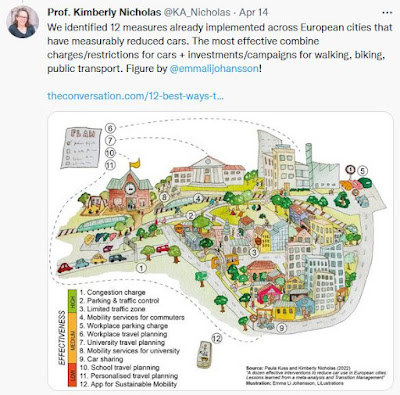Yesterday the team at Salem Bike Vision announced they had won a grant from People for Bikes to support their advocacy with community bike rides and for more attention to improving quality and number of bike lanes in projects funded by the infrastructure bond.
 |
| via Twitter |
That is great news!
The news was also a little old, having been announced by People for Bikes in December, and was something we totally missed here.
We don't pay as much attention to pure bicycle advocacy as we used to here on the blog, and this might be a good moment to discuss that again.
 |
| via Twitter |
BikePortland published this week a long meditation on the decline of cycling in the last decade or so in that city, "My thoughts on the cycling decline and a list of theories to explain it," and you should read it in full. They identify multiple variables:
- A socio-political-cultural shift
- The bike scene is still too white and too centrally located
- WTF WFH (Work From Home)
- Erosion of public safety
- Infrastructure & traffic safety fears
- The enforcement problem
- Driving is too easy
- Bike facility maintenance (and lack thereof)
- Gas is too cheap
- Demographic forces
- The local advocacy ecosystem
- Bike theft
- The rise of carsharing and micromobility
From here the most important have seemed to be:
- Gas is too cheap
- Driving is too easy
- Slack land use with useful things spaced too distantly (maybe geography more than demography)
- Infrastructure & traffic safety fears
The others are real factors, but they have seemed more secondary.
 |
| After the first bike boom April 2nd, 1902 |
Above all, having seen a wave of cycling in the late 2000s then fall off in the 20-teens, and also seen the ways previous booms in the 1890s, the boom of the Depression and wartime in the 1930s and early 40s, and the 1970s, here the ease, expense, and culture of driving has seemed like the primary cluster of variables.
 |
| Fees more effective than contests - Twitter |
No amount of cheering for bicycling would make a durable set of changes as long as we continued to support cars and driving with so many direct and indirect subsidies.
 |
| Midrise via FB (comment added) |
Sufficient numbers of people also have to be able to afford to live in places where biking makes sense. A few people are willing to make bike trips of several miles, but for most people greater proximity to useful things is important.
 |
| More midrise - via twitter |
Most of the images of best in class bike lanes and urban streets are full of midrise construction.
Even if Salem suddenly installed a network of protected bike lanes, without also changing our slack land use those lanes would not be used by enough people.
Proximity matters a lot.
The theme of safety does not seem to require much comment. You know, we all know.
The work that Salem Bike Vision is doing is important, and deserves full-throated support. Here on the blog we have seen cycles of advocacy with the Mid-Willamette Valley Chapter of the BTA, then with Salem Bike Boulevard Advocates, and now with Salem Bike Vision. The fact that the Vision has a sitting City Councilor as a principal, and involvement with the board members of Cherriots and the School District, means it may finally have the juice to surpass the efforts of the others, which did not seem able to find durable forms.
 |
| via Twitter |
But just cheering for bikes and installing better facilities will not be enough. We have to tame our autoism and find a new urban form. This is why the multi-pronged and more general advocacy at Strong Towns has sometimes seemed more useful than a narrow focus on bicycle advocacy.
Recently here see:
- "Break the Annual Cycles of Bike Month"
- On a Joint Council Work Session with Cherriots
- And occasional notes here on bike counts in Salem, also documenting a decline


No comments:
Post a Comment